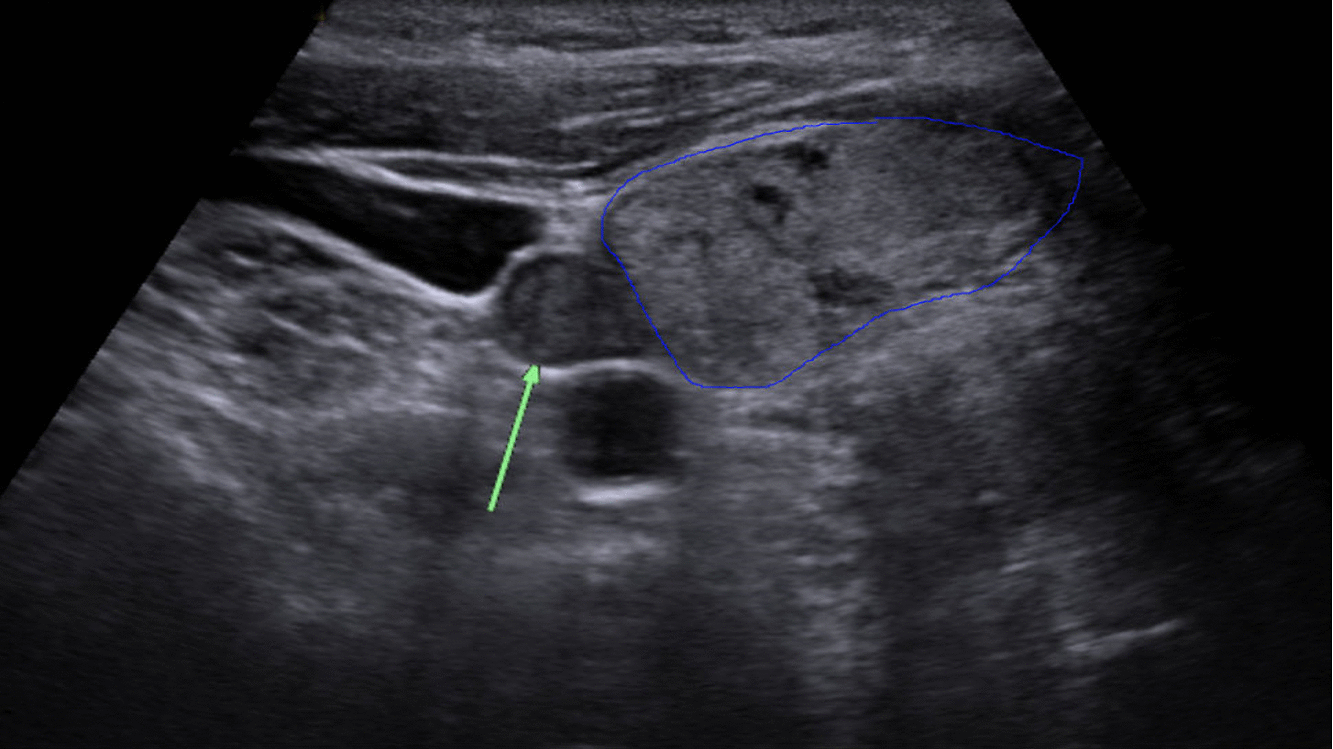Hyperparathyroidism ultrasound
|
Hyperparathyroidism Microchapters |
|
Diagnosis |
|---|
|
Treatment |
|
Case Studies |
|
Hyperparathyroidism ultrasound On the Web |
|
American Roentgen Ray Society Images of Hyperparathyroidism ultrasound |
|
Risk calculators and risk factors for Hyperparathyroidism ultrasound |
Editor-In-Chief: C. Michael Gibson, M.S., M.D. [1]; Associate Editor(s)-in-Chief: Anmol Pitliya, M.B.B.S. M.D.[2]
Overview
Neck ultrasound is used for preoperative localization of hyper-functioning parathyroid gland. Neck ultrasound alone is not a sensitive investigation for this purpose. Neck ultrasound along with Tc-99m sestamibi scintigraphy is most common used diagnostic modality for preoperative localization of hyper-functioning parathyroid gland.
Ultrasound
- Neck ultrasound is used for preoperative localization of hyper-functioning parathyroid gland. Neck ultrasound alone is not a sensitive investigation for this purpose. [1]
- Neck ultrasound is an operator dependent method.
- Neck ultrasound along with Tc-99m sestamibi scintigraphy is most common used diagnostic modality for preoperative localization of hyper-functioning parathyroid gland.[2]
- Presence of thyroid nodule may lead to false positive results.[3]
- Ultrasound is the single most cost-effective method used for preoperative localization of hyper-functioning parathyroid gland followed by 4-dimentional CT.[4]
- Surgeon performed ultrasound has a sensitivity of 69% to 92.5%.[5][6][7][8]

References
- ↑ Haber RS, Kim CK, Inabnet WB (2002). "Ultrasonography for preoperative localization of enlarged parathyroid glands in primary hyperparathyroidism: comparison with (99m)technetium sestamibi scintigraphy". Clin. Endocrinol. (Oxf). 57 (2): 241–9. PMID 12153604.
- ↑ Elaraj DM, Sippel RS, Lindsay S, Sansano I, Duh QY, Clark OH, Kebebew E (2010). "Are additional localization studies and referral indicated for patients with primary hyperparathyroidism who have negative sestamibi scan results?". Arch Surg. 145 (6): 578–81. doi:10.1001/archsurg.2010.108. PMID 20566979.
- ↑ Barbaros U, Erbil Y, Salmashoğlu A, Işsever H, Aral F, Tunaci M, Ozarmağan S (2009). "The characteristics of concomitant thyroid nodules cause false-positive ultrasonography results in primary hyperparathyroidism". Am J Otolaryngol. 30 (4): 239–43. doi:10.1016/j.amjoto.2008.06.007. PMID 19563934.
- ↑ Lubitz CC, Stephen AE, Hodin RA, Pandharipande P (2012). "Preoperative localization strategies for primary hyperparathyroidism: an economic analysis". Ann. Surg. Oncol. 19 (13): 4202–9. doi:10.1245/s10434-012-2512-2. PMC 3680347. PMID 22825773.
- ↑ Solorzano CC, Carneiro-Pla DM, Irvin GL (2006). "Surgeon-performed ultrasonography as the initial and only localizing study in sporadic primary hyperparathyroidism". J. Am. Coll. Surg. 202 (1): 18–24. doi:10.1016/j.jamcollsurg.2005.08.014. PMID 16377493.
- ↑ Prasannan S, Davies G, Bochner M, Kollias J, Malycha P (2007). "Minimally invasive parathyroidectomy using surgeon-performed ultrasound and sestamibi". ANZ J Surg. 77 (9): 774–7. doi:10.1111/j.1445-2197.2007.04227.x. PMID 17685957.
- ↑ Chapuis Y, Fulla Y, Bonnichon P, Tarla E, Abboud B, Pitre J, Richard B (1996). "Values of ultrasonography, sestamibi scintigraphy, and intraoperative measurement of 1-84 PTH for unilateral neck exploration of primary hyperparathyroidism". World J Surg. 20 (7): 835–9, discussion 839–40. PMID 8678959.
- ↑ Casas AT, Burke GJ, Sathyanarayana, Mansberger AR, Wei JP (1993). "Prospective comparison of technetium-99m-sestamibi/iodine-123 radionuclide scan versus high-resolution ultrasonography for the preoperative localization of abnormal parathyroid glands in patients with previously unoperated primary hyperparathyroidism". Am. J. Surg. 166 (4): 369–73. PMID 8214295.